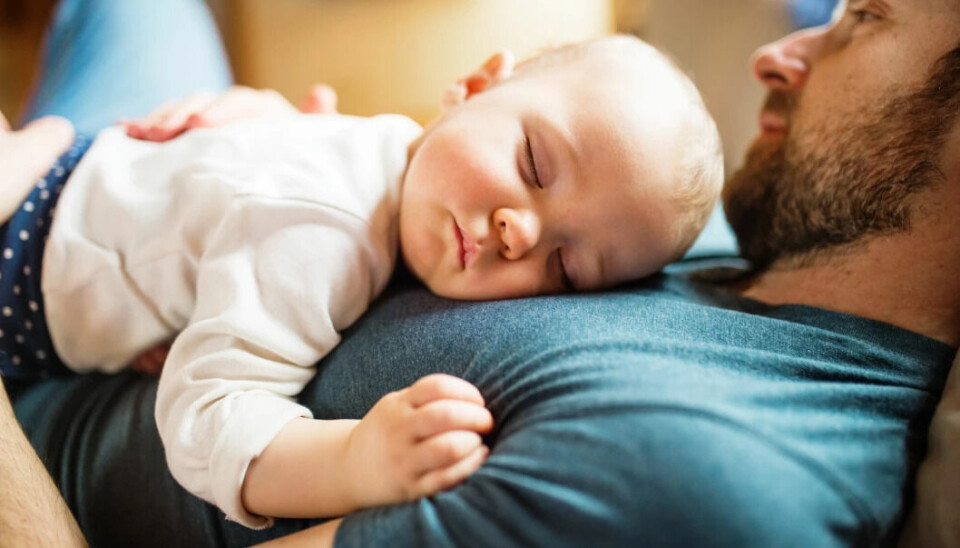
Parental leave gives better mental health, especially for mothers
For mothers, the effect lasts for a long time. For fathers, it is weaker and more short-lived.
Many struggle with mental health issues in connection with pregnancy and childbirth.
A large study from 2018 shows that around 17 per cent of all new mothers in Norway struggle with postpartum depression.
But it is not only women who are affected. Many men also experience depression after becoming a father.
In Norway, there has been little research on fathers, according to an op-ed in Stavanger Aftenblad (link in Norwegian).
But figures from Sweden and Denmark suggest that around 10 per cent of fathers struggle with their mental health in connection with pregnancy and birth.
Mest lest
Becoming parents is stressful
“Often we only think about the hormonal and physical changes that mothers experience, but the transition to becoming parents is stressful for the whole family,” Sol P. Juárez says.
She is a researcher at Stockholm University in Sweden, and is responsible for a new study carried out in collaboration with Karolinska Institute.
When the child is born, problems tied to childcare, work and finances also arise in the family.
What does parental leave mean for the mental health of the parents?
Juárez and colleagues have investigated this. They have looked at 45 scientific studies from high-income countries with parental leaves of at least two to three months.
Norway is one of the countries in the meta-study.
They also only included studies where there was a relevant group to compare with, for example parents who had not taken paid leave.
Parental leave particularly good for mothers
The parents who took the longest time off from work after the birth and had the most generous financial arrangements, had less problems with their mental health and experienced less stress after being on leave.
These are the main results from the study.
And it particularly applied to the mothers.
They had a reduced risk of common mental health issues such as depression and anxiety when they took paid leave that lasted more than a couple of months.
The connection between parental leave and mental health was also present among the fathers, but less clearly so.
The researchers also found no long-term effect on the fathers' mental health from being at home with the children.
A solid study
Eivor Fredriksen is associate professor at the Department of Psychology at the University of Oslo. She has researched postpartum depression among mothers and fathers.
According to Fredriksen, few studies have looked at the importance of parental leave for the parents' mental health. She therefore finds the Swedish review interesting.
“The researchers found that the studies were too different for them to be able to create a good meta-analysis of them and have therefore made a thorough research review. The differences lie in how the various studies have measured mental health, that leave arrangements in the relevant countries are different and how the studies are designed,” Fredriksen says.
Although it is difficult to draw conclusions from these studies, the researchers have done a solid job, she believes.
“When it comes to mothers' mental health the findings coincide especially well,” she says.

Different father roles
The studies that find the strongest effect of parental leave are those where the researchers have looked at countries where a change has been made to the leave system.
They have compared the transition from unpaid leave to paid leave, and the impact of leave becoming longer.
Fathers' involvement in the children’s lives varies much more between countries than mothers' involvement does. It is therefore more difficult to draw conclusions here, Fredriksen argues.
“The father's role in the child's first year of life varies around the world. This will also complicate these studies. It is therefore not easy to predict how a policy change towards more generous parental leave will affect fathers' mental health in different countries,” she says.
Why is parental leave a good thing?
Fredriksen believes it is interesting to know why parental leave can have a protective effect on mental health.
Is it because there is less stress and greater financial security?
Or is it because caring tasks are valued more highly and parents get the opportunity to give their child time and care?
Or because the infant also gets better health and well-being from good care, which in turn can have a positive effect on the parents' health?
“We don’t know the answer to this. More research is needed here,” she says.
———
Translated by Alette Bjordal Gjellesvik.
Read the Norwegian version of this article on forskning.no
Reference:
Heshmati et al. The effect of parental leave on parents’ mental health: a systematic review, The Lancet Public Health, vol. 8, 2023. DOI: 10.1016/S2468-2667(22)00311-5

































